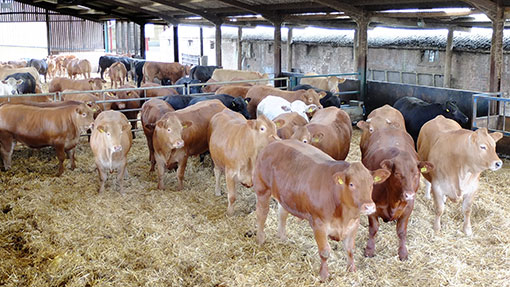Finishing pure-bred beef cattle offers health and growth benefits

Increasing numbers of commercial beef farmers are opting to finish pure-bred animals. Jeremy Hunt talks to two who have taken this approach.
Purity certainly doesn’t undermine commercial performance for one Buckinghamshire couple, who are seeing benefits in both herd health and growth rates when finishing pedigree Limousins.
Brian and Linda Lear run their Turville herd of 300-plus pedigree cows as commercial sucklers.
“We treat the herd commercially, but there are clear performance – as well as health – benefits from running pedigree cows to produce our finishing cattle.
See also: How to be in the top third of livestock farmers
“The pure-bred Limousin bulls as finishing cattle have the growth and can achieve the grades,” says Mr Lear.
The herd runs both black and red Limousins. “It was another commercially driven decision to introduce pedigree black genetics, primarily to introduce the polling traits, but also because of the strength of the eye muscle.
“The blacks are very strong in the loin and they have given us improved docility and are easy calving.”
The aim of the system at Creslow Manor, Creslow, Whitchurch, near Aylesbury, is to produce finished cattle with an E3 carcass weighing 420kg at 13 months.
“That’s our ideal target because we get penalised for anything over 420kg. We’re supplying cattle to a tight specification, but believe the pure genetics we’re dealing with are a big advantage.”
The Limousin cows are kept out as long as possible, but calving starts inside from the end of January. Cows are fed a maize silage and straw ration with added protein.
Calves are weaned and housed in October and all bull calves are left entire. They are all registered, but under breed society rules they can be deregistered before 15 months old, which enables any calves with breeding potential to be retained for use at home or for sale.
The bull calves are reared in straw yards in groups ranging from seven to 20 head and fed a maize silage-based diet with added home-grown ground wheat plus home-grown beans to provide a protein source.
“It’s essential is to keep these young bulls growing to achieve a weight gain of 1.6-1.8kg/day – and we can easily achieve that level with pure-bred Limousin bulls.
“We’ve just sold 13-month-old bulls weighing 420kg, but you’ve got to get the fat cover on them and that’s another area where the black Limousins score,” he says.
“I want E grades. If I get an E-minus that’s a real disappointment. You’ve got to hit the grades to get the premium,” says Mr Lear.
He’s convinced of the advantages of running a pure-bred suckler herd, but recognises there can be issues with the milking ability of some cows.
“We may lose out a little on hybrid vigour, but having brought in the black genetics it’s almost been like introducing a different breed. And the black cross red cows do get in-calf faster.”
The Lears, who haven’t bought-in any females for almost 20 years, believe herd health is a big advantage in running a closed commercial herd.
“Our primary aim at the start was to breed a herd of cows. We haven’t gone for extreme muscle types because we are a commercial beef business and we want a live calf from every cow.
“We’ve got the added advantage of performance figures behind all these cows so we’re not just relying on the sire of the calf to pass on good performance traits.”
The reduction in finished cattle prices are hitting all producers and while Mr Lear, like many others, is facing a loss of about £350 a head on bulls compared with this time last year. But he’s confident he’s better able to cope with the current situation with pure-bred finishing cattle.
“Commercial decisions underpin the way we manage the herd, even though we’re running pedigree cattle. Being able to turn cattle over as quickly as possible at 14-15 months old – and at the right weight and grade – is critical. And the pure-bred Limousin is helping us achieve that.”
Pure-breed beef cows outperform cross-breeds
Mike Wills and his son Charlie finish about 1,000 head of beef cattle a year at Upper Coton Farms, Guilsborough, Northampton, and are big supporters of pure-bred bulls.
“We buy-in a good number of pure-bred Limousin bulls for finishing. The average growth rate on our pure bulls at the moment is about 1.6kg/day, but some are doing more than that. The pure-bred bulls outperform the cross-breds,” says Mr Wills.
Bulls are bought-in at around eight to nine months old. “We’ve finished pure-bred bulls for a long time and tend to buy off the same herds in Cumbria and mid-Wales. Some will carry a high percentage of purity while others are 100% pure.”
All the finishing diets are based on straw, brewers’ grain, pot ale syrup, maize, wheat, barley and rape seed meal.
